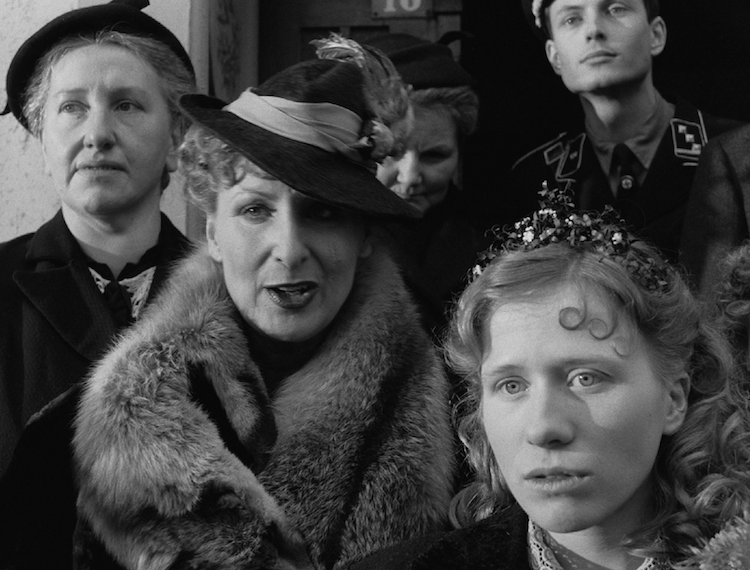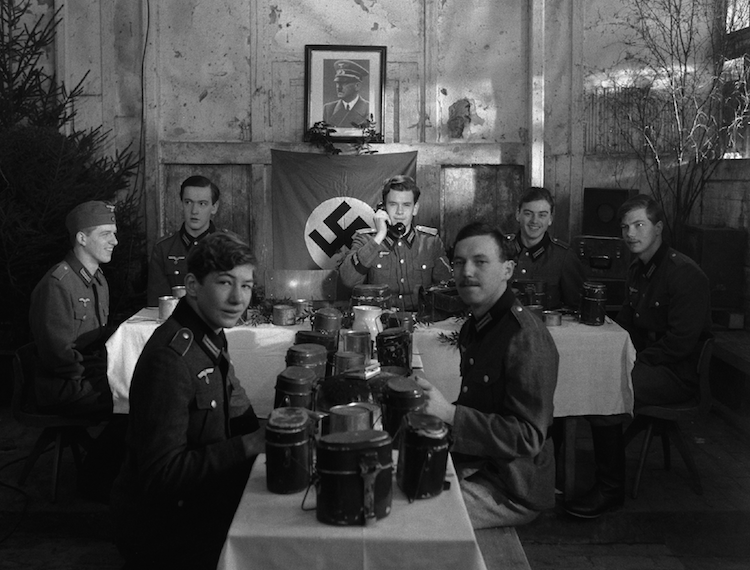Dir.: Christos Passalis, Syllas Tzoumerkas; Cast: Alexandros Vardaxoglou, Vassilis Kanakis, Angeliki Papoulia, Niki Papandreou, Vasillis Karaboulas; Greece 2022, 96 min
Actor and director Christos Passalis (Dogtooth) and Syllas Tzoumerkas (A Blast) get behind the camera for this incendiary expose revealing in six scenarios how Greece was complicit in the genocide of thousands of Jews from the city of Thessaloniki during the German occupation of the Second World War.
Even during the war the repression of Greek Jews was not a new thing: it started in 1927 with the foundation of the “Nationalist Union of Greeks” (EEE) and their newspapers that set out to fight the Jewish community for the low paid jobs. “Separate Jews from the Natives” was one of their slogans. “The Jew must go” – this one became reality under German rule; teaching the Jews a lesson was the edict of the times: “Jews must learn to do things with their hands other than counting money”. And “The time has come, for the yellow star people to pack their bags and go”.
Jews were lined up and put into the Baron Hirsch ghetto, whence they were deported to the death camps. Early in 1943 Sarina writes an imploring letter to her son Maurice, who has taken refuge with relatives in Athens. Concerned for his wellbeing she says: “Dear Maurice, we are all confined in the ghetto. This all seems to be the work of an experienced sadist. What we fear most are the deportations. Some trains have already left. On the day of the deportation, people burn money, documents and furniture. They abandon their whole life.”
Epanomi, 29 km from Thessaloniki, serves as a transit camp for the city’s Jews. Some are executed, others sent to German camps and a few are released after ten days. In an interlude, we watch the burial of Sarah, Sarina’s home help, who was treated like a daughter. Nina (Papandreou) is told to stop her brother chanting. Normality is soon replaced by reality. The 500-year old Jewish cemetery of the city, housing half a million tombs, is demolished by the Germans with the help of the local Christians during the second year of occupation. The broken marbles of the graves are used for the re-construction of several buildings, among them the St. Demeter cathedral. The bones of the dead are ground into sand for construction sites. In 1950, after litigation, the administration of the State of Greece builds on the top of the ruins of the Jewish cemetery the new part of the Aristotle University. In 2014 the government installs a memorial stone at the University campus.
Only 4% percent of the Jewish population will survive. Nina’s (Papandreou) report from the Hirsch ghetto: “Arriving at the Hirsch Ghetto, we are pushed into a room with German soldiers. They lifted our skirts, stripped us naked and used their fingers to probe our privates for hidden jewellery. This included my ten-year old sister. When they found nothing, they started slapping my mother. Hasson, one of the Orologas brothers, cut her hair with a pen knife, injuring her scalp. The son of our local butcher got so angry he tried to kill Hasson, but he failed and was shot on the spot. My mother was put into a cell under ground, we never saw her again. Our Rabbi, 70-year old, had to clean the ghetto with a broom for a whole day.”
After liberation, Hasson was executed, but the bigger names survived. In 1957, Max Merten, the butcher of Thessaloniki, visited Greece and was arrested. After eight months he was let go, the West German government had offered a loan. SS Captain Dr. Alois Brunner, Eichmann’s ‘right hand’ died peacefully in 2010 as consultant to Syria’s Hafez el-Assad.
After a dreamlike meeting between Nina and Mauricein the old city, we learn that the city’s brothels had been destroyed after the war. Some of the business was done in the old railway station of Stravrapouli, where the Pavlos Mecas camp had been.
The last part is a surrealistic collage that sees one of the surviving members of the family trying to get government compensation, meanwhile, on the beach, the last peaceful years of Sarina’s family play out with a competition to find the ‘most moronic’ winner of a fancy dress event.
Reality bites again: In 1943, after the deportations ended, thousands of Jewish businesses were again sequestered, snapped up by local entrepreneurs and state institutions. After the war, hundred sought the return of their property. Not even half of them were successful, the main reasons for denial were “Abandonment by the former owners” and “the lack of death certificates for the victims in the death camps”.
Cinematically brilliant and thematically relevant The City and The City once again proves that the Holocaust was not an isolated event. Before, during and after WWII Jews were the victims of state-organised pogroms, supported by a majority of the population who they thought were their neighbours and friends. AS
BERLINALE FILM FESTIVAL 2022 | 10-20 FEBRUARY 2022

 Eduard falls in love with social climber Lucie (Rasenack), who runs a brothel and talks him into joining the SA. Back in the village, another member of the Simon clan is imprisoned in a KZ, for his Communist Party leanings. Maria has now fallen in love with the engineer Otto Wohlleben, but a letter from Paul, who is living in the USA, destroys any future for them. When Paul finally remerges, arriving in Hamburg, he cannot enter the country due to to his name being misconstrued as being ‘Jewish’ – and he has no proof of his Aryan ancestry. Meanwhile Otto is defusing bombs at the front when he learns that Maria has borne him a son called Hermann who he will meet for the first time at the end of the war, when American troops arrive in the village, after the Allies’ victory in 1945, bringing with them a sense of normality – and food. Paul finally returns from the USA, his big limousine is the talk of the village. But his return is not celebrated by everyone and he soon goes back, missing the funeral of his grandmother Katherinna (Bredel). Maria lives her life through her son Hermann who is interested in music and poetry. He eventually falls for Klärchen, who is eleven years older than him. Paul has since sold his company to the Americans for a huge profit, and channels his success into helping Herman with his musical career.
Eduard falls in love with social climber Lucie (Rasenack), who runs a brothel and talks him into joining the SA. Back in the village, another member of the Simon clan is imprisoned in a KZ, for his Communist Party leanings. Maria has now fallen in love with the engineer Otto Wohlleben, but a letter from Paul, who is living in the USA, destroys any future for them. When Paul finally remerges, arriving in Hamburg, he cannot enter the country due to to his name being misconstrued as being ‘Jewish’ – and he has no proof of his Aryan ancestry. Meanwhile Otto is defusing bombs at the front when he learns that Maria has borne him a son called Hermann who he will meet for the first time at the end of the war, when American troops arrive in the village, after the Allies’ victory in 1945, bringing with them a sense of normality – and food. Paul finally returns from the USA, his big limousine is the talk of the village. But his return is not celebrated by everyone and he soon goes back, missing the funeral of his grandmother Katherinna (Bredel). Maria lives her life through her son Hermann who is interested in music and poetry. He eventually falls for Klärchen, who is eleven years older than him. Paul has since sold his company to the Americans for a huge profit, and channels his success into helping Herman with his musical career. The shoot ran from 1981, and took 18 months, before 13 months of editing resulted in a 15-hour potted version, down from 18 hours of rough-cut. Over ten million West Germans watched the eleven episodes. Thanks to DoP Gernot Roll, a later cinema version was internationally successful, the seemingly arbitrary changes from colour to black-and-white and back giving the chronicle of the years between 1919 and 1982 an added feature. The main premise of HEIMAT was to show how ordinary people – in this case the Germans – can easily embrace a murderous regime such as Nazism, and even in a small village like Schabbach, could tolerate the existence of the concentration camps, almost turning a blind eye. These same people went on to embrace consumerism, this time following in the footsteps of the Americans. Reitz would follow Heimat with The Second Heimat (1992), Heimat – Fragments – The Story of the Women in Heimat (2006) and Home from Home (2013) – all together another 30 hours viewing, premiered at the Venice Film Festival, which became Reitz’ second home.
The shoot ran from 1981, and took 18 months, before 13 months of editing resulted in a 15-hour potted version, down from 18 hours of rough-cut. Over ten million West Germans watched the eleven episodes. Thanks to DoP Gernot Roll, a later cinema version was internationally successful, the seemingly arbitrary changes from colour to black-and-white and back giving the chronicle of the years between 1919 and 1982 an added feature. The main premise of HEIMAT was to show how ordinary people – in this case the Germans – can easily embrace a murderous regime such as Nazism, and even in a small village like Schabbach, could tolerate the existence of the concentration camps, almost turning a blind eye. These same people went on to embrace consumerism, this time following in the footsteps of the Americans. Reitz would follow Heimat with The Second Heimat (1992), Heimat – Fragments – The Story of the Women in Heimat (2006) and Home from Home (2013) – all together another 30 hours viewing, premiered at the Venice Film Festival, which became Reitz’ second home.